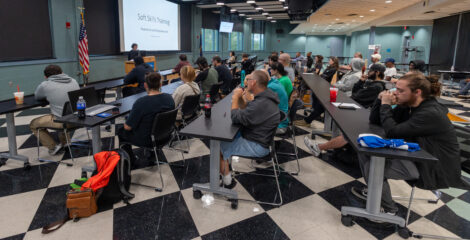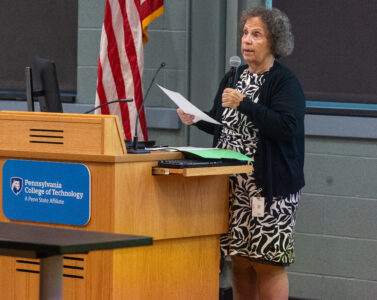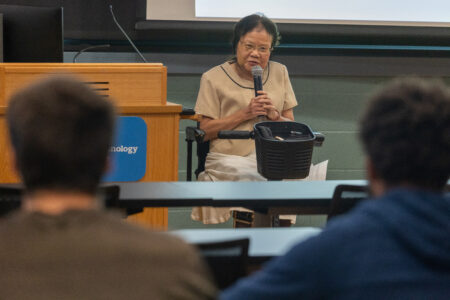‘Work brings dignity’: Reentry leaders hold employment workshop
- KAREN VIBERT-KENNEDY/Sun-Gazette President Judge Nancy Butts speaks to the crowd during the Path to Empowerment Workshops. The event, hosted by GEO and Lycoming County Reentry Coalition provided re-entrants with the skills needed to secure employment, better represent themselves during the hiring process and retain employment.
- KAREN VIBERT-KENNEDY/Sun-Gazette President Judge Nancy Butts speaks to the crowd during the Path to Empowerment Workshops. The event, hosted by GEO and Lycoming County Reentry Coalition provided re-entrants with the skills needed to secure employment, better represent themselves during the hiring process and retain employment.
- KAREN VIBERT-KENNEDY/Sun-Gazette Chris Tsai, chair of employment committee, speaks to the crowd during the Path to Empowerment Workshops. The event, hosted by GEO and Lycoming County Reentry Coalition provided re-entrants with the skills needed to secure employment, better represent themselves during the hiring process and retain employment.
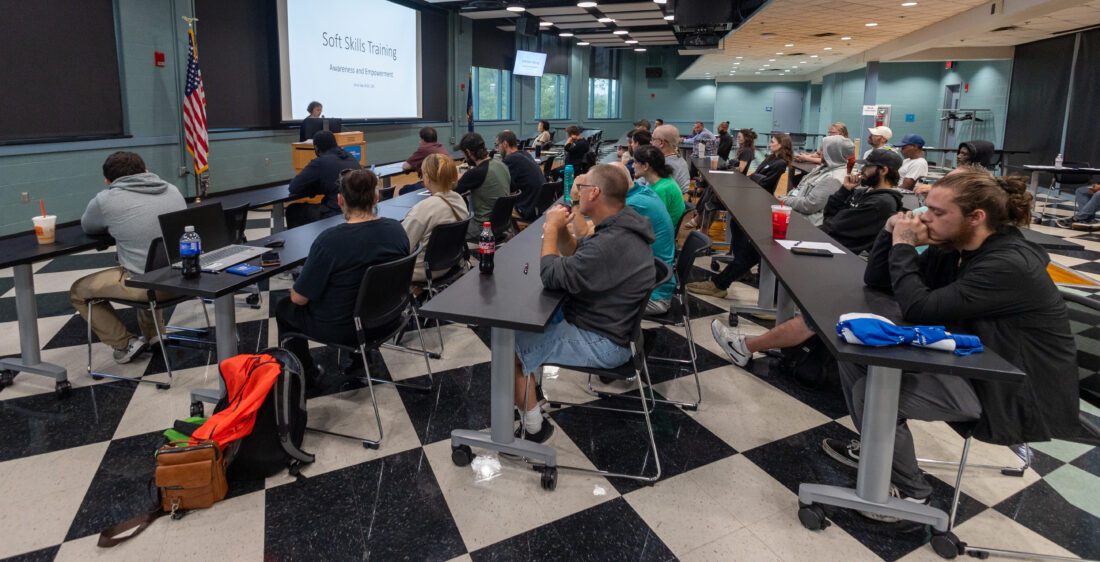
KAREN VIBERT-KENNEDY/Sun-Gazette President Judge Nancy Butts speaks to the crowd during the Path to Empowerment Workshops. The event, hosted by GEO and Lycoming County Reentry Coalition provided re-entrants with the skills needed to secure employment, better represent themselves during the hiring process and retain employment.
GEO Reentry Services and the Lycoming County Reentry Coalition hosted a workshop with the goal of providing justice-involved re-entrants with various skills related to securing and maintaining employment at Pennsylvania College of Technology Thursday.
Several topics were covered with attendees, including resume building, creating cover letters, preparing for interviews, along with mock interviews and managing stress and health.
This was the second such joint event, the first one being an employer seminar in 2023, according to Chris Tsai, chair of the employment subcommittee under the Lycoming County Reentry Coalition.
“My committee’s goal is to assist this population to be able to get a second chance to restart their life, which means to get a job and be able to maintain an independent and productive life so that they don’t have to be stuck in a cycle and return to prison,” she said.
“We want the individual to have those skills because even if they get a second chance, a lot of them do not know how to make these good decisions or deal with conflict, especially how to have good communication with co-workers or their supervisors at work, and they end up either quitting the job or they get fired,” Tsai said.
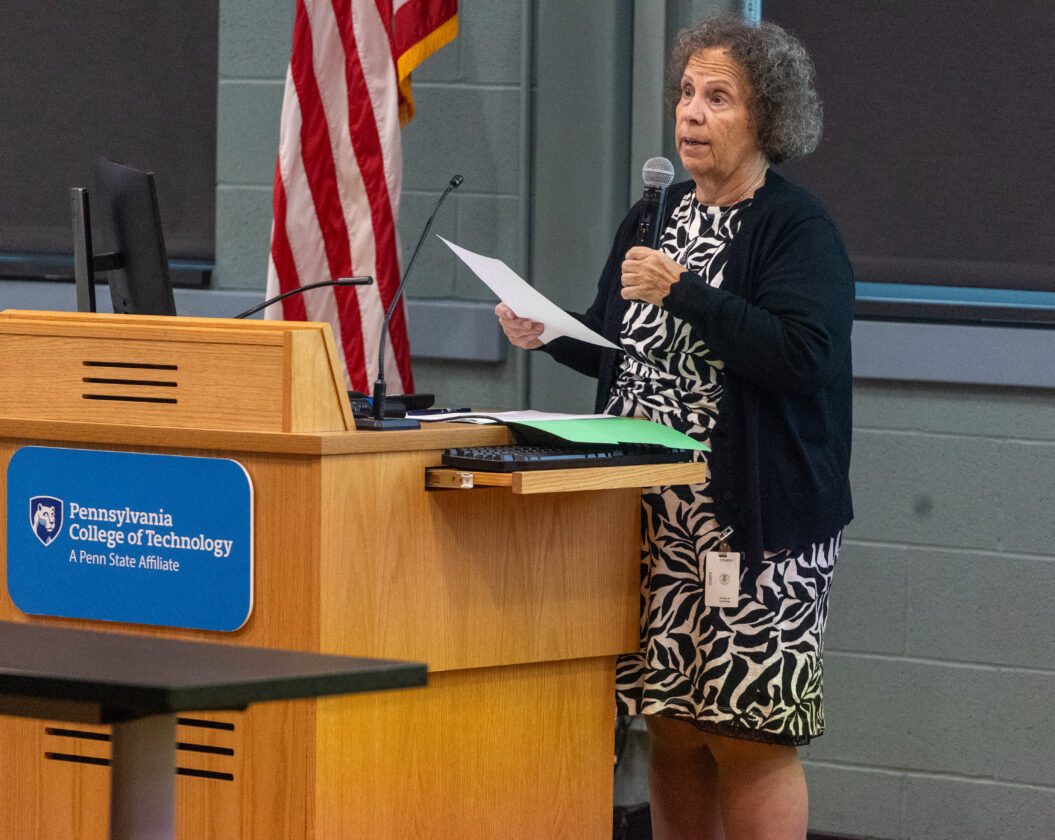
KAREN VIBERT-KENNEDY/Sun-Gazette President Judge Nancy Butts speaks to the crowd during the Path to Empowerment Workshops. The event, hosted by GEO and Lycoming County Reentry Coalition provided re-entrants with the skills needed to secure employment, better represent themselves during the hiring process and retain employment.
Although it has been hard to quantify, Tsai said that they have seen a shift in hiring
practices.
“We do know that some employers in our area are more receptive, but certain work lines, like restaurants, factories and hospitals are still very shut,” Tsai explained.
Tsai retired from the Office of Vocational Rehabilitation after a 30-year career, 22 of which were spent as a counselor.
“60 to 70% of my clientele had some sort of criminal background, and it was challenging to place them into a workplace. It’s hard to sell them, especially if they don’t know how to sell themselves,” she said, explaining why she has continued her work past retirement.
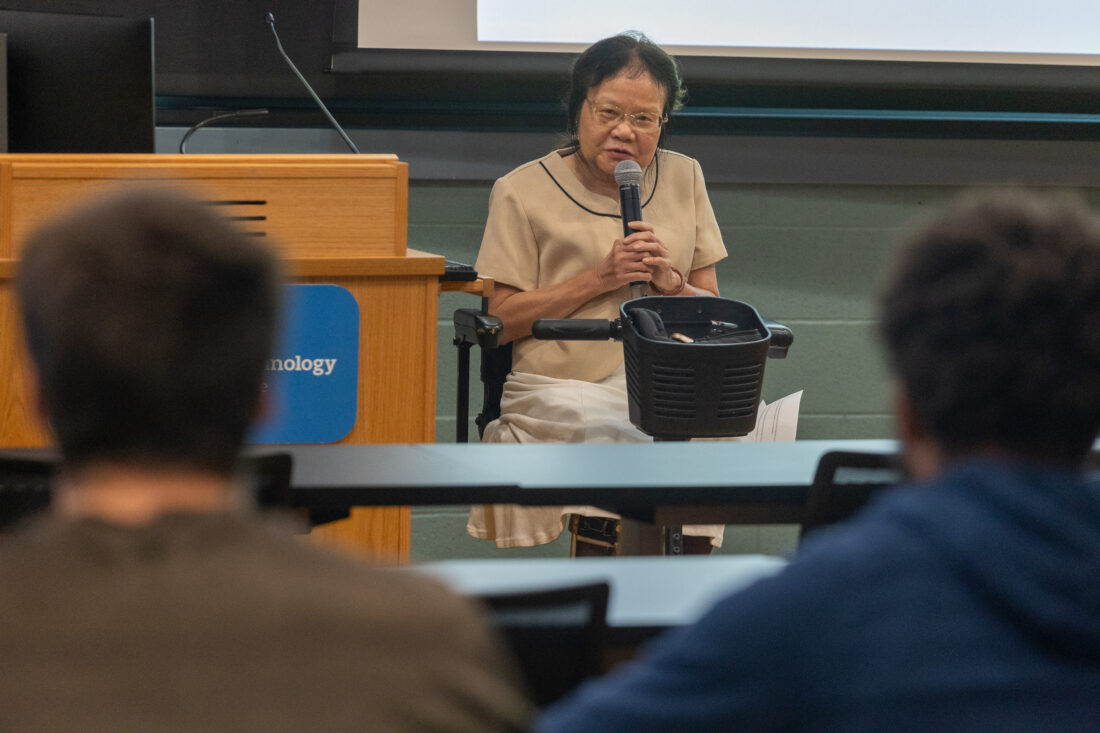
KAREN VIBERT-KENNEDY/Sun-Gazette Chris Tsai, chair of employment committee, speaks to the crowd during the Path to Empowerment Workshops. The event, hosted by GEO and Lycoming County Reentry Coalition provided re-entrants with the skills needed to secure employment, better represent themselves during the hiring process and retain employment.
“I do see the value of it and the need for collaboration. It takes a village and maybe more than a village. This is why it’s really precious when agencies can work together to make things happen for this population, because some of them come out of jail having nothing. They don’t even have a place to stay. Housing continues to be such an issue. We have some shelters, but it’s not enough for them,” Tsai said.
A bright spot for her has been seeing those helped through her efforts help others who are in the spot they once were.
“One of our trainers for the workshop had a pretty substantial criminal background, but after he got out of jail, he really straightened up, and he actually formed a nonprofit organization himself, and he shares his knowledge, and he’s helping this population directly,” Tsai said.
Tsai hopes this event and the progress justice-involved individuals have can help alleviate concerns employers might have about taking them on.
“It’s so crucial for them to recognize the value and importance of giving them a second chance, because a lot of them are good workers with good values. They just made a mistake, and as long as they correct the mistakes, they deserve a second chance,” she stressed.
This year’s keynote speaker was Lycoming County Court of Common Pleas Judge Nancy Butts, who previously worked as a public defender, a law clerk and an Assistant District Attorney before being elected in November of 1995.
Since 1998, Butts has been instrumental in a number of treatment courts, including drug, DUI, mental health and veterans courts.
“I’ve seen people walk in broken, angry and tired, tired of the cycle, tired of being judged. Tired of feeling like they’ll never get ahead,” Butts said.
“We’ve all made mistakes, but I’ve also seen what happens when somebody gets the right mix of structure, support and opportunity,” she continued.
“I’ve seen what happens when people get their first paycheck, when they get to pay their own bills and buy groceries for their kids, and pay their rent on time. They feel like a human, again, responsible, proud and in control of their own life. That’s the power of employment. It’s not just income. It’s an identity, it’s freedom,” Butts said, going on to highlight the importance of stress management.
“Managing stress doesn’t erase the past, but it helps you stay present- and future-focused. This is about stacking winds, not waiting for a miracle,” she said.
“If you’re not managing your mental health, your physical health, your day-to-day responsibilities, it’s hard to hold down a job, much less build a career. It’s survival skills, how to cope, how to avoid burnout and how to keep it together when things get hard,” Butts said.
While the three year recidivism rate in the state sits at 64.7%, Butts said that nationally, those returning to society who stay employed for at least a year have a recidivism rate of just 16%, compared to over 50% for those without steady work.
“Those ripple effects are huge. According to a study by the Economy League of Greater Philadelphia, over $1.2 million is generated in annual wages when 100 justice-involved Pennsylvanians are employed, $1.9 million in wage taxes are paid, and over $800,000 goes back to taxes. But if those same 100 people go back to jail that costs the state over $2 million a year,” Butts said.
“These aren’t just abstract numbers. They’re a reflection of the potential that each of you has,” she stressed.
“Work brings dignity, it brings routine. It creates forward motion, and it removes you from the isolation of being in your own head,” Butts said.
The judge also stressed the importance of community involvement in helping justice-involved individuals with their re-entry.
“It’s about believing that people can change and backing that belief with action. Reducing recidivism by just 5% saves the state nearly $2 million. But what’s the price of one life turned around, one child growing up with a parent who came home and stayed home, one person who becomes a mentor instead of a cautionary tale? These aren’t easy to measure, but they matter just as much,” she said.
“Here in Lycoming County, we’ve started moving people over to the pre-release center so that they can take advantage of employment even before their case is disposed of and get GED training,” Butts said.
The county is also in talks with Penn College on an apprenticeship program in order to afford those formerly incarcerated with new skills, as well as to solidify skills they already possess.
“But, none of it matters if the door doesn’t open in the first place,” Butts said, noting that the agencies have begun reaching out to area employees to educate them on how vital employment can be in helping someone turn their life around.
“What we’re doing here is showing them what quality people we have that can make their operation a better, more stable, more successful investment,” she said.
“You are not the worst thing you’ve ever done. You are who you choose to become next,” Butts said, closing with words of encouragement.
“Nobody gets through this alone, but together, we can make the road a whole lot smoother,” she said.
“We all want safer communities, stronger families and a justice system that actually leads to justice, and this is how we get here, skills, support and second chances,” the judge said.

